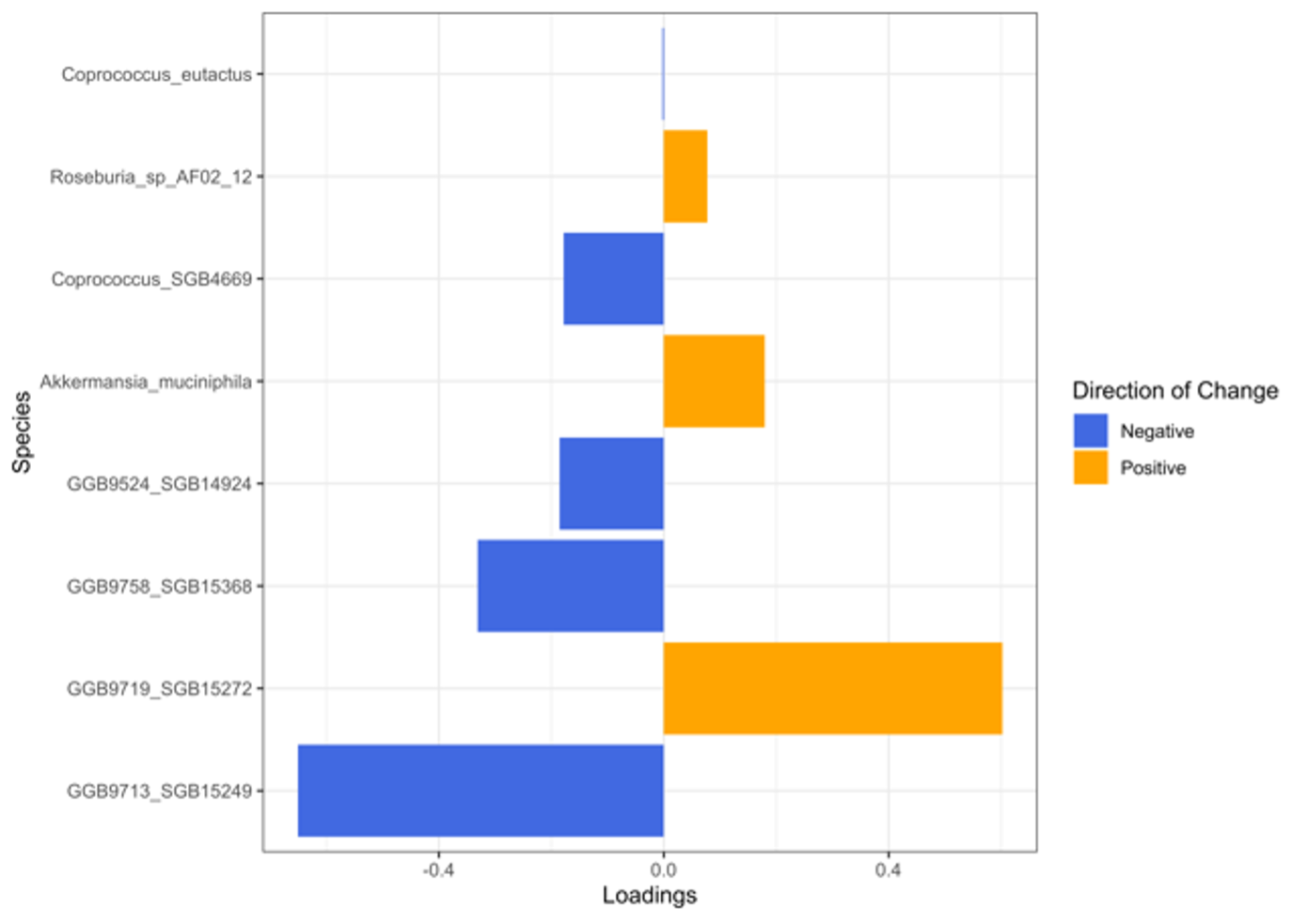Session Information
Date: Monday, October 27, 2025
Title: (1553–1591) Systemic Sclerosis & Related Disorders – Clinical Poster II
Session Type: Poster Session B
Session Time: 10:30AM-12:30PM
Background/Purpose: GI disease is highly prevalent in systemic sclerosis (SSc) and adversely affects quality of life and survival in SSc. The pathogenesis of GI disease in SSc is poorly understood; however, accumulating evidence suggests that alterations in the GI microbiome occur early in the SSc disease course [1] and are associated with specific SSc phenotypes [2]. No prior studies have investigated whether specific bacterial species associate with GI symptoms. The purpose of this study was to identify bacterial species associated with GI symptom severity in patients with SSc from across the world.
Methods: SSc patients from 7 SSc centers across 5 continents provided a stool sample. Shotgun metagenomic sequencing was performed using the Illumina NovaSeq 6000 to characterize microbial composition at the species level. The UCLA GIT 2.0 was administered at the time of the stool collection to evaluate GI symptom severity. Multivariate Sparse Partial Least Squares Regression (sPLS-R) was used to examine whether there was a species signature associated with GI symptom severity, controlling for body mass index, current proton pump inhibitor use, current supplemental probiotic use, current or prior immunomodulatory therapy, presence of small intestinal bacterial overgrowth, interstitial lung disease and study site.
Results: Of the 274 participants, 83.5% were female, and 13.9% had SIBO. The mean (SD) disease duration was 9.49 (9.29) years. Among 257 bacterial species, the multivariate s-PLS-R identified a linear combination of 8 species associated with total GIT 2.0 score (r=0.38 (95% CI 0.24, 0.50), t(170)=5.29, p < 0.0001) (Figure 1). In terms of specific lower GI symptoms, s-PLS-R identified a linear combination of 15 species associated with constipation score (r=0.45 (95%CI 0.32, 0.56), t(171)=6.60, p < 0.0001) (Figure 2) and a linear combination of 9 species associated with distension score (r=0.37 (95%CI 0.23, 0.49), t(174)=5.18, p < 0.0001) (Figure 3). Six of the 8 species associated with total GIT 2.0 scores overlapped with species associated with either constipation or distension scores.
Conclusion: The results of this cross-sectional, international study demonstrate that the abundance of specific intestinal bacterial species in patients with SSc is associated with the severity of GI disease. These species and/or their metabolic products may serve as markers of GI disease severity in SSc and potentially contribute to SSc-GI pathogenesis. References1. Bellando-Randone S, et al. RMD Open. 2024;10:e004647. 2. Andréasson K, et al. ACR Open Rheumatol. 2022;4:417–25.
 Figure 1. Feature loadings on the species-derived Total GIT 2.0 symptom severity signature from sPLS-R analysis (Nf172). Features are ranked from highest (bottom) to lowest (top); species with higher loadings (i.e., weights) contributed the most to the signature score. For each species, positive and negative loadings reflect positive (orange bars) and negative association (blue bars) between that species and Total GIT 2.0 scores.
Figure 1. Feature loadings on the species-derived Total GIT 2.0 symptom severity signature from sPLS-R analysis (Nf172). Features are ranked from highest (bottom) to lowest (top); species with higher loadings (i.e., weights) contributed the most to the signature score. For each species, positive and negative loadings reflect positive (orange bars) and negative association (blue bars) between that species and Total GIT 2.0 scores.
.jpg) Figure 2. Feature loadings on the species-derived constipation severity signature from sPLS-R analysis (Nf172). Features are ranked from highest (bottom) to lowest (top); species with higher loadings (i.e., weights) contributed the most to the signature score. For each species, positive and negative loadings reflect positive (orange bars) and negative association (blue bars) between that species and constipation scores.
Figure 2. Feature loadings on the species-derived constipation severity signature from sPLS-R analysis (Nf172). Features are ranked from highest (bottom) to lowest (top); species with higher loadings (i.e., weights) contributed the most to the signature score. For each species, positive and negative loadings reflect positive (orange bars) and negative association (blue bars) between that species and constipation scores.
.jpg) Figure 3. Feature loadings on the species-derived distension severity signature from sPLS-R analysis (Nf172). Features are ranked from highest (bottom) to lowest (top); species with higher loadings (i.e., weights) contributed the most to the signature score. For each species, positive and negative loadings reflect positive (orange bars) and negative association (blue bars) between that species and distension scores.
Figure 3. Feature loadings on the species-derived distension severity signature from sPLS-R analysis (Nf172). Features are ranked from highest (bottom) to lowest (top); species with higher loadings (i.e., weights) contributed the most to the signature score. For each species, positive and negative loadings reflect positive (orange bars) and negative association (blue bars) between that species and distension scores.
To cite this abstract in AMA style:
McMahan Z, Joshi S, Labus J, Young A, Low A, Smith V, Proudman S, Valenzuela A, Hunter P, Andréasson K, Aja E, Jacobs J, Volkmann E. Association of the gastrointestinal (GI) microbiome and GI symptoms in systemic sclerosis: An international, multi-center, observational study [abstract]. Arthritis Rheumatol. 2025; 77 (suppl 9). https://acrabstracts.org/abstract/association-of-the-gastrointestinal-gi-microbiome-and-gi-symptoms-in-systemic-sclerosis-an-international-multi-center-observational-study/. Accessed .« Back to ACR Convergence 2025
ACR Meeting Abstracts - https://acrabstracts.org/abstract/association-of-the-gastrointestinal-gi-microbiome-and-gi-symptoms-in-systemic-sclerosis-an-international-multi-center-observational-study/
